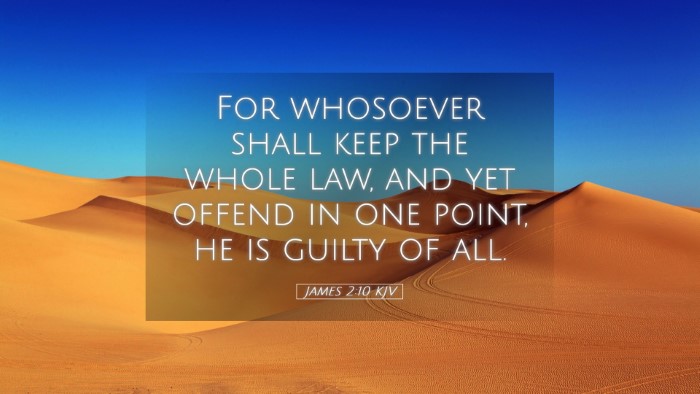Old Testament
Genesis Exodus Leviticus Numbers Deuteronomy Joshua Judges Ruth 1 Samuel 2 Samuel 1 Kings 2 Kings 1 Chronicles 2 Chronicles Ezra Nehemiah Esther Job Psalms Proverbs Ecclesiastes Song of Solomon Isaiah Jeremiah Lamentations Ezekiel Daniel Hosea Joel Amos Obadiah Jonah Micah Nahum Habakkuk Zephaniah Haggai Zechariah MalachiJames 2:10
James 2:10 KJV
For whosoever shall keep the whole law, and yet offend in one point, he is guilty of all.
James 2:10 Bible Commentary
James 2:10: "For whosoever shall keep the whole law, and yet offend in one point, he is guilty of all."
Introduction
James 2:10 serves as a powerful theological assertion regarding the nature of God's law and the concept of sin. This verse succinctly encapsulates the argument that even a single transgression against God's commandments results in the individual being guilty of violating the entire law. Such a principle has profound implications for our understanding of grace, accountability, and the human condition.
Contextual Analysis
The Epistle of James is often regarded as practical wisdom literature, addressing the ethical and moral conduct of believers. The surrounding verses emphasize the importance of faith and works, culminating in the assertion found in 2:10. James seeks to illustrate that true faith manifests in righteous living, and failing in even the slightest area demonstrates the fallibility of mankind.
The Law as a Unit
Matthew Henry expounds that the law, epitomized by the Ten Commandments, represents a cohesive whole. To violate one commandment is to undermine the authority and intention of the law entirely. This perspective highlights the inextricable link between different aspects of moral obligation. The law is not merely a set of isolated commands but is intended to function as a unified standard of righteousness.
Albert Barnes reinforces this idea, suggesting that God's law is perfect, and thus it cannot tolerate any deviations. If an individual claims to uphold the entire law while failing at one point, he cannot escape the judgment that accompanies transgression. This view calls attention to the seriousness with which the law should be regarded.
Implications for Humanity
James 2:10 emphasizes the universality of sin among humankind. Adam Clarke notes that this verse underscores the inherent nature of man's sinful condition. All have sinned and fall short of the glory of God (Romans 3:23). This principle reveals the futility of relying solely on one's righteousness to merit justification before God.
Furthermore, the verse serves as a warning against self-righteousness. Many may find solace in perceived moral superiority over others. However, James confronts this attitude by elucidating that even a minor violation implicates one in the broader guilt of sin. This understanding cultivates humility and dependence on God’s grace for salvation.
The Nature of Freedom in Christ
The teaching of James 2:10 raises critical questions about the role of the law in the life of the believer. Matthew Henry points out that while believers are not under the law as a means of justification, they are nonetheless called to live by the Spirit of life in accordance with God's will. This interplay between grace and obedience signifies that true faith must express itself in genuine moral behavior.
Albert Barnes adds that this understanding encourages believers to strive for holiness while recognizing that perfection is unattainable in this life. Instead, believers should focus on growth in grace, seeking to reflect God’s character through their conduct, thus embodying the essence of the law.
Call to Accountability
James’ words serve as a sober reminder of accountability. Adam Clarke suggests that our transgressions, whether considered minor or major, are significant in the eyes of God. This truth compels believers to engage in self-examination and repentance regularly, fostering a deeper awareness of their spiritual condition.
Moreover, this passage underscores the communal responsibility that believers have towards one another. Believers are called not only to adhere to the law themselves but to encourage one another in the pursuit of holiness, reflecting the interconnectedness of the Christian community.
Conclusion
In conclusion, James 2:10 encapsulates profound truths regarding the law, sin, and the nature of human righteousness. The insights drawn from the commentary of esteemed theologians such as Matthew Henry, Albert Barnes, and Adam Clarke unite to present an in-depth understanding of this pivotal verse. For pastors, students, theologians, and scholars, this text serves as a reminder of the importance of holistic obedience to God's commands, the implications of sin, and the inherent need for grace in the believer's life.


